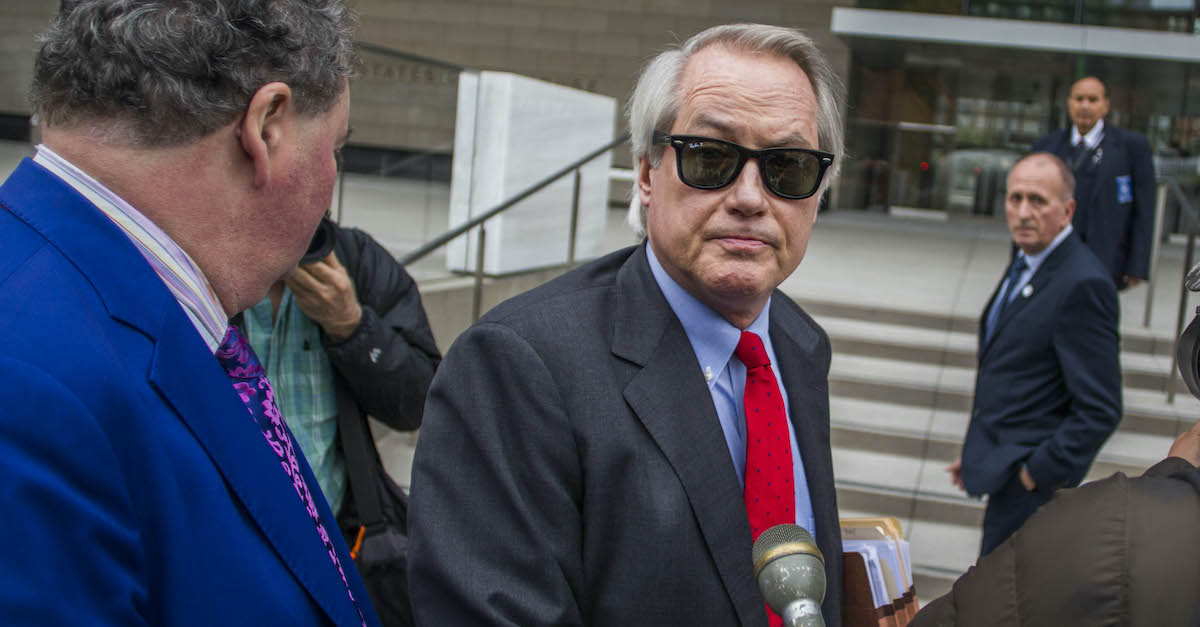
As one of the most prominent faces in Donald Trump’s failed efforts to overturn the results of the 2020 presidential election through the series of lawsuits collectively known as the “Kraken,” attorney Lin Wood has been under the microscope for weeks, if not months, for troubling statements he’s made on social media. Now, the embattled lawyer, no longer on Twitter, has claimed that the Georgia State Bar told him he must undergo a mental health exam if wants to keep his law license.
“I am fighting battles on every front,” Wood wrote to his followers on what appears to be the “Telegram” app in a message that was flagged Thursday by Reuters reporter Jan Wolfe.
“The State Bar of Georgia told me today that they would demand a mental health exam from me if I wanted to keep my law license. My mind is sound. I have broken no rules. I asked what I had done wrong, I was only told it was about my social media comments. My speech,” the message said.
Wood had previously claimed that an attorney from the Georgia Bar had contacted his attorney to inquire if he would “submit to an independent health exam.”
“Are you kidding me?” he wrote. “If the State Bar of Georgia starts testing its members for mental health and alcoholism (I have not had a drink in over 8 years), 75% of the lawyers in Georgia will not be able to practice law. I will be one of the 25% still practicing.”
Wolfe said in follow-up tweet on Friday that the Georgia Bar confirmed that Wood has been asked to undergo a mental health evaluation.
Law&Crime reached out to the State Bar of Georgia as well and received the same confirmation. The Bar said that the investigative process is normally confidential, but since Wood spoke about it publicly the Bar confirmed Wood is under investigation “pursuant to Bar Rule 4-104.”
That rule states as follows:
Rule 4-104. Mental Incapacity and Substance Abuse
(a) Mental illness, cognitive impairment, alcohol abuse, or substance abuse, to the extent of impairing competency as a lawyer, shall constitute grounds for removing a lawyer from the practice of law.
(b) Upon a determination by the State Disciplinary Board that a lawyer may be impaired or incapacitated to practice law as a result of one of the conditions described in paragraph (a) above, the Board may, in its sole discretion, make a confidential referral of the matter to an appropriate medical or mental health professional for the purposes of evaluation and possible referral to treatment and/or peer support groups. The Board may, in its discretion, defer disciplinary findings and proceedings based upon the impairment or incapacity of a lawyer to afford the lawyer an opportunity to be evaluated and, if necessary, to begin recovery. In such situations the medical or mental health professional shall report to the State Disciplinary Board and the Office of the General Counsel concerning the lawyer’s progress toward recovery. A lawyer’s refusal to cooperate with the medical or mental health professional or to participate in the evaluation or recommended treatment may be grounds for further proceedings under these Rules, including emergency suspension proceedings pursuant to Rule 4-108.
In addition to promulgating falsehoods about the 2020 election being stolen from former President Trump, Wood has made numerous other baseless claims about leading political and legal figures, such as Chief Justice John Roberts. In December of last year, Wood claimed without evidence that the chief justice had nefarious links to now-deceased infamous pedophile Jeffrey Epstein.
“My information from reliable source is that Roberts arranged an illegal adoption of two young children from Wales through Jeffrey Epstein,” Wood wrote on Twitter before his account was permanently suspended. “I think we can all agree that Epstein knows pedophilia. If only Jeffrey Epstein was still alive . . .Wouldn’t that be something?”
Te tweet led to immediate backlash, but Wood pushed the theory in a follow-up tweet.
“I am fully aware of the onslaught of attacks being made against me based on my revelations about Chief Justice John Roberts. Before attacking me, maybe fair-minded people would first ask Roberts to tell the truth,” he wrote, adding, “Or ask Jeffrey Epstein. He is alive.”
Law&Crime’s new podcast, “Objections” with Adam Klasfeld, obtained audio this week relating to a case against Wood by his former law partners.
The ex-partners had claimed in the litigation that recordings showed Wood confessing to assaulting them, threatening them in profane rants, and—in one instance—asserting that he may be “Christ coming back for a second time in the form of an imperfect man.” The lattermost was not among the recordings Law&Crime obtained, but several other recordings filed in Fulton County court were.
“Your law partner Lin Wood is not just good,” Wood can be heard referring to himself in the third person in one of the tapes. “Your law partner Lin Wood has courage and he has an inherent ability to know truth. Your partner Lin Wood is great. You should feel like shit, but I still love you. And I’m still your law partner.”
Law&Crime asked Wood on Friday if he plans to comply with the mental health evaluation, considering that the applicable rule states a “lawyer’s refusal to […] participate in the evaluation or recommended treatment may be grounds for […] emergency suspension proceedings.”
Wood responded by saying he has “not received any formal notice from the State Bar of Georgia.”
“I do not believe the State Bar has the right to violate my First Amendment right of free speech for comments made as a private citizen,” Wood said. “If they attempt to do so, I will aggressively defend my Constitutional rights just as I would do for a client in the same situation.”
Wood directed us to the other comments he made on Telegram @LinWoodSpeaksTruth.
Editor’s note: comment from Lin Wood was added post-publication.
Matt Naham contributed to this report.
[image via Apu Gomes/Getty Images]